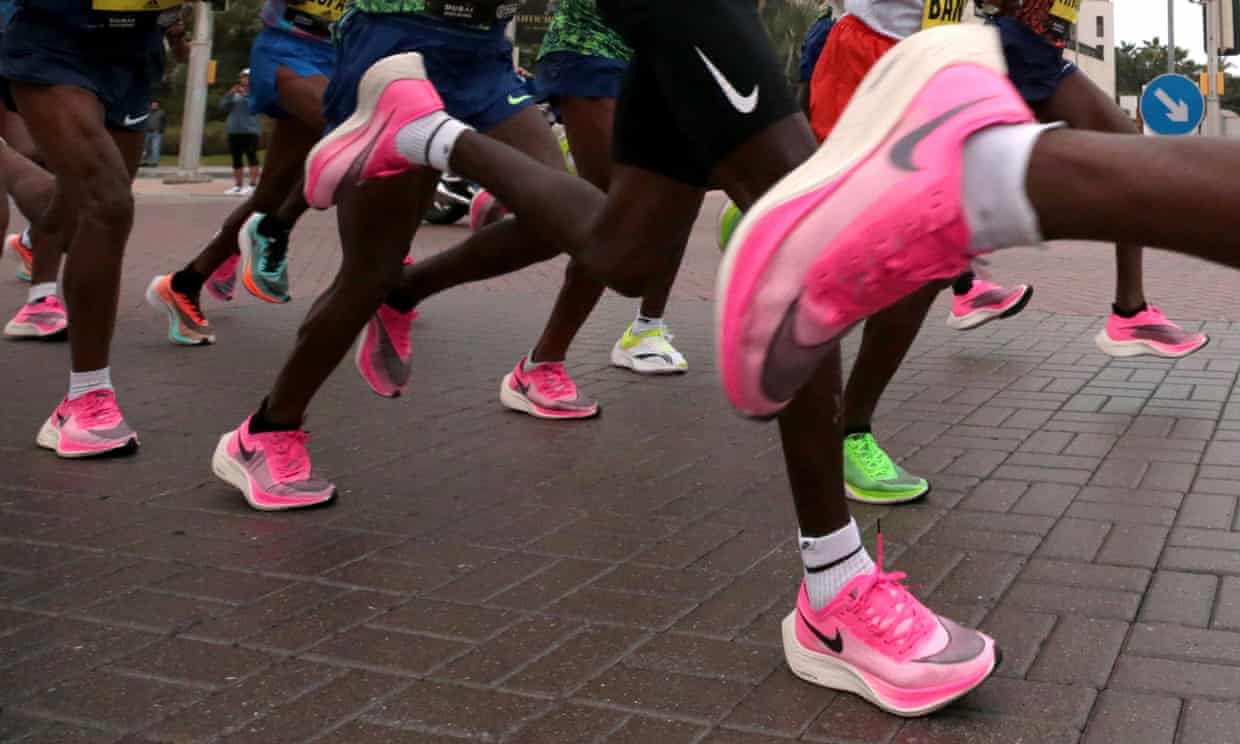
Athletics
World Athletics gives seal of approval for controversial Nike Vaporfly shoes
by Sean Ingle• Governing body will set limits on future shoe technology
• World Athletics panel of experts orders new research
The hugely controversial Nike Vaporfly shoes that have revolutionised running – allowing elite athletes to shatter world marathon records and ordinary ones to smash their personal bests – have been given the seal of approval by World Athletics.
In a long-awaited ruling the sport’s governing body confirmed that Nike Vaporfly and Next%s, which cost £240 and can improve marathon times by one-to-two minutes in elite athletes, are legally allowable despite many in the sport accusing the shoes of being like “technological doping”.
However, World Athletics has put an “indefinite moratorium” on future advances in shoe technology because it admits “there is sufficient evidence to raise concerns that the integrity of the sport might be threatened by recent developments”.
The Vaporflys, which were first introduced in 2016, work due to a combination of a new lightweight but hard foam, called Pebax, which is fused with a curved carbon plate to create a ‘spring’ effect that ensures far less energy is lost with each step.
But they have continued to cause controversy and rancour in the athletics world because of the scale of their advantage compared with all other rival shoes. Jake Riley, an American runner who finished ninth in last year’s Chicago marathon, described wearing the Nike Next% as “like running on trampolines”.
What has particularly infuriated rival brands is that Nike has taken out several patents on the angle of the carbon plate – making it even harder for them to catch up – while the Pebax foam is also not widely available either.
The new rules from World Athletics state that shoe companies are not allowed to let their athletes run in prototypes any more – and from 30 April 2020, any shoe must have been available for purchase by any athlete on the open retail market for a period of four months before it can be used in competition.
There is also an “indefinite moratorium” on any new shoe that has a sole thicker than 40mm and has more than one rigid embedded plate or blade.
The new regulations mean that the next generation Nike AlphaFly, worn by Eliud Kipchoge when he ran 26.2 miles in under two hours in Vienna in October, would not be permissible as they were said to contain three carbon plates and have a sole thicker than 40mm.
However, as the Guardian first reported this week, the Nike models worn by Kipchoge and Brigid Kosgei to shatter the official men’s and women’s marathon records in the past 18 months are legal.
In the meantime World Athletics panel of experts has recommended that further research be undertaken to establish “the true impact of this technology” and to assess any new shoes that enter the market in the future.
Speaking after the decision was announced, World Athletics president, Sebastian Coe, said the decision was a proportionate one. “It is not our job to regulate the entire sports shoe market but it is our duty to preserve the integrity of elite competition by ensuring the shoes worn by elite athletes in competition do not offer any unfair assistance or advantage,” he said.
“As we enter the Olympic year, we don’t believe we can rule out shoes that have been generally available for a considerable period of time but we can draw a line by prohibiting the use of shoes that go further than what is currently on the market while we investigate further.
“I believe these new rules strike the right balance by offering certainty to athletes and manufacturers as they prepare for the Tokyo 2020 Olympic Games, while addressing the concerns that have been raised about shoe technology. If further evidence becomes available that indicates we need to tighten up these rules, we reserve the right to do that to protect our sport.”
However, the decision will not placate many in the sport, who believe the shoes have given Nike-sponsored athletes a massive and unfair advantage for years.
Matt Yates, a former Olympian and now a top coach, told the Guardian that the new regulations were a case of too little, too late. “Athletes have lost out medals, funding and financial support because Nike have been allowed to break the rules while World Athletics slept and done nothing,” he said. “It’s the same as doping, it’s simply cheating.”